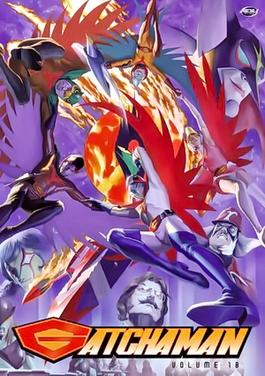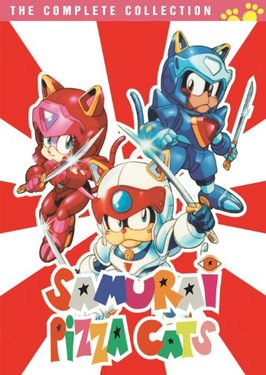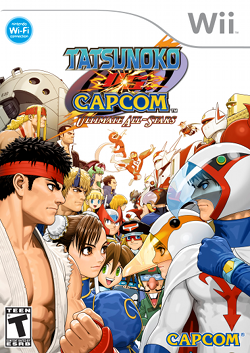This article needs additional citations for verification .(May 2008) |
This is a list of video games based on the anime series Science Ninja Team Gatchaman .
This article needs additional citations for verification .(May 2008) |
This is a list of video games based on the anime series Science Ninja Team Gatchaman .
| Battle of the Planets | |
|---|---|
 | |
| Developer(s) | Mikro-Gen Ltd |
| Publisher(s) | Mikro-Gen Ltd |
| Platform(s) | Amstrad CPC, Commodore 64, ZX Spectrum |
| Release | 1986 |
| Genre(s) | Action |
| Mode(s) | Single-player |
Battle of the Planets is a video game based on a television series of the same name. The game was published in 1986 by Mikro-Gen Ltd for various home computer systems, including the Amstrad CPC, Commodore 64 and ZX Spectrum. [1]
| Kagaku Ninjatai Gatchaman | |
|---|---|
 | |
| Developer(s) | Family Soft |
| Publisher(s) | Family Soft |
| Platform(s) | PC-98 |
| Release | 1994 |
| Genre(s) | Strategy |
Kagaku Ninjatai Gatchaman is a strategy video game produced by Family Soft.
| Gatchaman: The Shooting | |
|---|---|
 | |
| Publisher(s) | Bandai |
| Platform(s) | PlayStation |
| Release |
|
| Genre(s) | Action |
| Mode(s) | Single-player |
Gatchaman: The Shooting is an action game based on the Gatchaman television series.
| Pachi-Slot Gatchaman | |
|---|---|
 | |
| Publisher(s) | Banpresto |
| Platform(s) | PlayStation 2 |
| Release | |
| Genre(s) | Action |
| Mode(s) | Single-player |
Pachi-Slot Gatchaman is a video game of the television series of the same name. The game was only released in Japan.

1942 is a vertically scrolling shooter by Capcom that was released as an arcade video game in 1984. Designed by Yoshiki Okamoto, it was the first game in the 194X series, and was followed by 1943: The Battle of Midway.

Science Ninja Team Gatchaman is a Japanese animated franchise about a five-member superhero ninja team created by Tatsuo Yoshida and produced by Tatsunoko Productions. The original anime series, which debuted in 1972, was eponymously entitled Kagaku Ninja-tai Gatchaman and is best known in the English-speaking world as the adaptation entitled Battle of the Planets (1978). The series had additional English adaptations with G-Force: Guardians of Space (1986) and ADV Films' uncut 2005 release. Tatsunoko also uses the official translation Science Commando Gatchaman in related products and media.

Samurai Pizza Cats is an American animated television adaptation of the anime series Kyatto Ninden Teyandee, produced by Tatsunoko Productions and Sotsu Agency. The series originally aired in Japan on TV Tokyo from February 1, 1990 to February 12, 1991 for a total of 54 episodes. Saban Entertainment picked up the North American rights to the series in 1991 and produced a 52-episode English adaptation.

Kyatto Ninden Teyandee is a Japanese anime series produced by Tatsunoko Productions and Sotsu Agency. The series originally aired in Japan on TV Tokyo from February 1, 1990, to February 12, 1991, for a total of 54 episodes. Saban picked up the North American rights to the series in 1991, and produced an English version called Samurai Pizza Cats. The creators stated that there was going to be a spin-off series, Kyatto Keisatsu Beranmee. The series is known for its cultural humor consisting of Japanese puns, pop culture, and fourth-wall breaking.

Tatsunoko Production Co., Ltd. and often shortened to Tatsunoko Pro, is a Japanese animation company. The studio's name has a double meaning in Japanese: "Tatsu's child" and "sea dragon", the inspiration for its seahorse logo. Tatsunoko's headquarters are in Musashino, Tokyo.

Tekkaman: The Space Knight is a Japanese anime produced by Tatsunoko Productions in 1975. A short-lived English adaptation aired in the U.S. in 1984. The first 13 episodes streamed in Japanese with English subtitles on Anime Sols as of spring 2013 exclusively in North America, but the website is now defunct. All 26 episodes were streaming on Viewster in several countries until the website went defunct in 2019. In the 1990s, it was followed by the much more popular Tekkaman Blade, which was dubbed in the U.S. by Saban as Teknoman.

Tekkaman Blade is a 1992 Japanese anime television series produced by Tatsunoko Production and Sotsu Agency. The series was directed by Hiroshi Negishi and written by Mayori Sekijima and Satoru Akahori. The story follows an organization called the Space Knights and their war against aliens known as the Radam. The Space Knights are assisted by Takaya Aiba, who has the ability to transform into an armored warrior known as Tekkaman Blade.

SonSon is an arcade video game by Capcom released in July 1984. It is loosely based on the Chinese novel Journey to the West. The player assumes the role of a monkey boy and fights their way from one side to another, eventually reaching the statue of Buddha. One battles bats, rats, and mad bombers along the way with his fighting rod that shoots balls of fire.

The Capcom Five are five video games that were unveiled by Capcom in late 2002 and published from March 2003. At a time when Nintendo's GameCube console had failed to capture market share, Capcom announced five new GameCube titles with the apparent goal of boosting hardware sales and demonstrating third-party developer support. Capcom USA followed up with confirmation that they would be exclusive to the GameCube. The five games were P.N.03, a futuristic third-person shooter; Viewtiful Joe, a side-scrolling action-platformer; Dead Phoenix, a shoot 'em up; Resident Evil 4, a survival horror third-person shooter; and Killer7, an action-adventure game with first-person shooter elements. Though not directly related to each other, they were all overseen by Resident Evil director Shinji Mikami and, except Killer7, developed by Capcom's Production Studio 4. Capcom USA later clarified that only Resident Evil 4 was intended to be exclusive; the initial announcement was due to a miscommunication with their parent company.

Yatterman is a Japanese anime television series broadcast from January 1, 1977 to January 27, 1979, comprising 108 episodes. It is the second and longest show in the Time Bokan series by Tatsunoko Productions. The series succeeded Time Bokan and preceded Zenderman. It was also the final series to be produced by company founder Tatsuo Yoshida prior to his death.

Street Fighter is a Japanese media franchise centered on a series of fighting games developed and published by Capcom. The first game in the series was released in 1987, followed by six other main series games, various spin-offs and crossovers, and numerous appearances in other media. Its best-selling 1991 release Street Fighter II established many of the conventions of the one-on-one fighting genre.

Gatchaman II is the direct sequel to Science Ninja Team Gatchaman, set two years after the first television series. After the defeat of Leader X, he exacts his revenge by capturing, brainwashing and mutating a young intersex child known as Sammy into Giersadora and making them the new leader of Galactor and successor to Berg Katze. While Galactor returns, Dr. Nambu and the International Science Organization bring the Science Ninja Team Gatchaman back into active duty. This series and Gatchaman F would be the basis of the English-language version named Eagle Riders. Sentai Filmworks has licensed the series and released the complete series on DVD on April 18, 2017.

Tatsunoko vs. Capcom: Ultimate All-Stars is a crossover fighting game developed by Eighting and published by Capcom. The game features characters from both Capcom's video game franchises and various anime series produced by Tatsunoko Production. It was originally released in Japan for arcades and the Wii video game console in December 2008 as Tatsunoko vs. Capcom: Cross Generation of Heroes. Following high demand from international fans, Capcom worked with Tatsunoko to resolve international licensing issues and a second version, Ultimate All-Stars, was released for the Wii in North America, Japan, and Europe in January 2010, featuring additional characters and online multiplayer.

Tatsunoko Fight is a fighting video game developed by Electronics Application (Eleca) and published by Takara for the PlayStation game console released in Japan in October 2000. It features characters from various Tatsunoko superhero properties in addition to original creations developed exclusively for the game. Each series is represented by characters, backgrounds, music, and voice actors from the original television programs, along with new art and animated sequences produced by Tatsunoko Production.

Long Vo is an entrepreneur, freelance illustrator, producer and creative/art director.
Since the release of the Nintendo Wii, many aesthetic, ergonomic and functional accessories have been developed by third parties for the console’s controller, the Wii Remote.

Paon DP Co., Ltd. (株式会社パオン・ディーピー) is a Japanese video game developer. The company was founded in August 2004 as DP Inc. and merged with Paon Corporation, Ltd. in March 2015 to form Paon DP.

Viewtiful Joe is a side scrolling beat 'em up video game franchise created by Japanese game designer Hideki Kamiya. It is primarily developed and published by Capcom and its subsidiary Clover Studio.